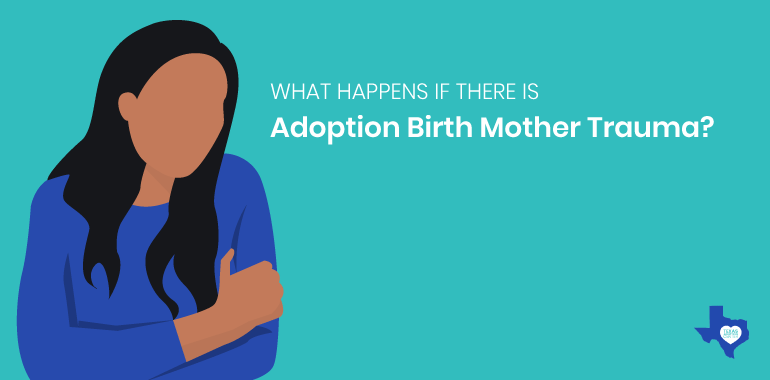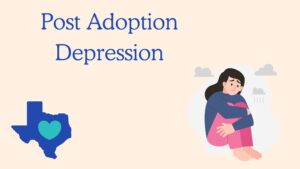
Adoption is a journey filled with various emotions: confidence, relief, guilt, grief, and doubt. As a birth mother, sorting through your feelings during and after the adoption process can seem like an impossible task. One day you are proud of yourself for making the right decision for your baby, and the next, you may feel sad that you can’t be an active part of their life.
Adoption birth mother trauma is something that many mothers struggle with leading up to childbirth and years after. Whatever you feel, it’s important to understand that your emotions are valid. For some, dealing with these emotions is difficult to do on their own. If you are having a hard time processing your emotions during or after the adoption process, you are not alone. Plenty of other women have experienced exactly what you are going through. The best thing you can do to get through this time is to ask for help or find resources to cope with your emotions.
Let’s talk more about adoption birth mother trauma and the coping skills you can use to help you through this difficult time.
What is Adoption Birth Mother Trauma?
According to Medical News Today, psychological trauma is a response to an event that a person finds highly stressful. This response can cause a range of both physical and emotional symptoms. Adoption birth mother trauma is the physical or psychological response birth mothers feel during or after they place their baby for adoption.
In her article Silent Voices Heard Impact of the Birth Mother Experience: Then and Now, Donna Portuesi, MSW, explains that the adoption experience “may be a lifetime journey.” That’s why it’s completely normal to experience a sudden onset of emotions months or even years after you place your baby for adoption.
The signs of adoption birth mother trauma range from mild to severe. Several factors determine how the trauma affects you individually. For example, mothers who feel forced to choose adoption may experience more trauma than a mother who is confident in her independent decision. Regardless of their severity, trauma can be experienced in various psychological and physical ways.
Psychological Responses to Trauma
Psychological trauma is often the type of trauma that people cite when speaking about adoption trauma. This trauma includes feelings of:
- Guilt
- Denial
- Anger
- Sadness
- Shame
- Anxiety
- Depression
- Fear
- Confusion
- Hopelessness
- Irritability
- Numbness
Emotional responses can also include difficulty concentrating or coping with emotions. Trauma can even cause withdrawal from others or avoid situations that remind you of the adoption. Flashbacks, emotional outbursts, and nightmares can also occur as the individual relives the event’s trauma in their mind.
Physical Responses to Trauma
In addition to psychological trauma, some individuals experience physical symptoms as a result of trauma, including:
- Digestive issues
- Headaches
- Nausea
- Fatigue
- Increased heart rate
- Feeling of uneasiness
- Insomnia
Substance abuse, anxiety, and post-adoption depression for birth mothers are also common. One study found that 87.7% of women surveyed experienced post-adoption depression for birth mothers. If you are noticing any of these symptoms in your life, there are several things you can do to cope with birth mother trauma and live a happy, fulfilling life.
What to Do if You’re Experiencing Birth Mother Trauma
There are several ways you can work towards healing from birth mother trauma. These strategies will allow you to process everything you feel, which is the first step in recovery. They will also help you find creative ways to cope with your emotions now and if they resurface in the future. Here are some effective coping strategies to help you through adoption birth mother trauma.
Practice Self-Care
When dealing with trauma, your mind and body can be a mess. Not only are you experiencing a range of emotions, but you’re probably not taking care of yourself the way you should. That’s why it’s important to set aside time for self-care. Self-care can be scheduling a coffee date with someone who makes you smile, taking a walk, or blocking out time for your favorite hobby.
Do whatever makes you feel good and nourishes your mind, body, and soul. The more you pour into yourself during this challenging time, the easier it will be to recover from the difficult days.
Take Time to Journal
Writing down your thoughts and feelings can be healing. Not only will it reveal what it is you are struggling with, but looking back on your previous journal entries can also show you how you’ve grown. Journaling is also a great way to get negative thoughts out of your mind. Keep your journal somewhere private, so you feel safe writing down your most intimate feelings. Writing down negative thoughts, then ripping up and throwing out the paper can also feel satisfying.
Educate Yourself
Education is an important strategy in your healing toolbox. Learning about how the adoption journey has changed over the years can help you feel better about your decision. The more you know, the more you will see that many other mothers feel the exact emotions you’re struggling to navigate.
You can dig deeper into your feelings by researching how they relate to the adoption process. You can find additional coping strategies, personal accounts from other mothers, and supportive resources that help you work through specific emotions like grief. A simple Google search will lead you to articles, resources, and other educational material about various topics related to the adoption process.
Find a Support Group
Complicated feelings like those of unworthiness, shame, and guilt can take longer to work through for proper healing. Finding a support group of other women with adoption birth mother trauma can be an excellent coping tool. Birth mothers from every stage of the process attend these groups. You’ll hear from women just like you. In support groups, you will not only find help, but you will also find acceptance.
While their experiences probably won’t be identical to yours, you’ll find women who share similar feelings. Those further along in the healing process will provide you with practical strategies and resources to help you through each stage of the process. As you begin to heal and grow, you’ll do the same for women just starting their healing journey. Most importantly, support groups will be a source of hope. You will realize that you’re not alone and every single thing you feel is normal.
Enroll in Professional Counseling
Individualized counseling can help you heal from the effects of post-adoption depression or other negative emotions associated with being a birth mother. Professional counseling isn’t just empowering, but it can also give you a sense of clarity and renewed purpose. A licensed therapist can help you move through the different healing stages by addressing the past and giving you tools to move into the future.
When it comes to professional counseling, find someone who directly experiences working with adoption birth mothers. Enrolling in adoption support services from Texas Adoption Center, for example, gives you access to professionals who have successfully helped other women through the healing process. Taking advantage of therapy, case management, and emotional support can help you work through the negative emotions holding you back.
Are You Struggling with the Effects of Adoption Trauma? We’re Here to Help!
Although choosing adoption is common today, everyone processes the experience differently. How you feel about your adoption journey is valid and normal. Coping with those feelings, however, isn’t always easy. With Texas Adoption Center, you are never alone as you work through the emotions of adoption.
Our compassionate team is here to empower you through the adoption process. We want you to see your future as bright and productive, but we also know that not all days will be happy ones. That’s why we’re here to support you when things get complicated. We have helped women just like you find the healing they need for a future filled with hope. Whether you are pregnant and considering adoption or are in the post-adoption process, we’re here to help.






